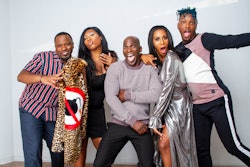
Andrew Roby is the founder and corporate event planner at Washington, D.C.-based Andrew Roby Events. When not producing social, corporate, and other private events, he travels as a keynote and motivational speaker.
 Andrew Roby, the founder and corporate event planner at Andrew Roby Events.Photo: Jerris Madison
Andrew Roby, the founder and corporate event planner at Andrew Roby Events.Photo: Jerris Madison
It’s easy to get caught up in the struggle Black people have faced over so many years. Aside from slavery, we continue to face other forms of adversity. Despite a record 109 months of uninterrupted job growth, with the overall unemployment rate falling to its lowest level in 50 years, African Americans still struggle to get a job, let alone a good one. Race and gender bias intersect to the point where Black women’s work experiences are devalued, confining which doors are open, and widening the labor wage and market gaps.
At least 65% of Black Americans say the increased national attention on racial inequality has not led to changes that improved their lives. Roughly 44% of Blacks say equality for Black people in the U.S. is not likely to be achieved, according to Pew Research Center. Equally important, Black Americans are concerned about racial discrimination and its impact.
These things and more can explain why many Blacks spend most of their time during Black History Month outlining the grievous issues at hand. While every single means to advocate for better Black lives is necessary, I fear we are missing a very key element of why Black History Month started. So often the history of Black people is tied to trauma, violence, and resilience. But what about Black joy, and when do we get to celebrate it?
Harvard-trained historian Carter G. Woodson wanted to raise awareness of African Americans' contributions to civilization when he founded the Association for the Study of Negro Life and History (ASNLH). It was called Negro History Week in 1925—what we now know as Black History Month. The birth of this was to celebrate and honor the too-often neglected accomplishments of Black Americans in every area of endeavor throughout our history.
I’m a big fan of Beyoncé. At this year’s Grammys I was elated that a Black woman now holds the title of the most Grammy awards ever won in history. This is a huge accomplishment that also caused the Black community to give a side eye when we realized the possible reason she lost Album, Record, or Song of the Year.
Members of the Recording Academy, a professional association that gives the awards, candidly spoke about who would receive their Grammy votes and why. While nominated for the highest awards, Beyoncé would never receive them for reasons that had nothing to do with music. One voter, as told by a Variety article, admits she didn’t choose the singer because she has “already won a lot of Grammys.” Another admits to “not having listened to “a significant percentage,” of her music and “that’s my right.”
When it comes to celebrating Black people, there are no limitations. It’s in the celebration that we have a much better appreciation as to why Black people matter. To celebrate means to acknowledge and express pride in what someone has done, no matter how many times it has occurred.
While Black History Month has come to a close, there are things all of us can do to reconcile with the past and celebrate the accomplishments of Black people year-round, especially those things happening right now. Listen to Black podcast creators such as Historically Black, Code Switch, and Seizing Freedom. Check out the Black History 101 Mobile Museum, which tours around the country with a diverse, interactive exhibition. Use museums such as the The National Museum of African American History and Culture in Washington, D.C., or the National Center for Civil and Human Rights in Atlanta as team-building opportunities.
Use apps such as EatOkra to connect with “Black restaurants and culinary events while amplifying the dining experience for and by Black communities.” Show up to rallies and be an active member outside of your cul-de-sac. Offer referrals and nominate Black event professionals for national and global awards that aren't just geared toward diversity, equity, and inclusion. Celebrate them publicly when they win such awards or land those clients. Highlight in your company newsletter ways to celebrate Black excellence as it happens. Partner with Black influencers and content creators for your ads and marketing campaigns. When you have a mind to celebrate, you no longer punish Black people for simply existing. You honor them, their worth, and their contributions in the same manner you do everyone else.
The ways in which you can celebrate and increase Black joy are endless. One thing is for sure, Black people will always celebrate their Blackness. We are Black in and out of the month of February, but this is bigger than that. Failing to understand Black history and the unwillingness to celebrate such accomplishments will only lead to resentment and further extend the divide between us. If a global superstar like Beyoncé has to deal with those unwilling to celebrate her accomplishments, imagine what everyday Black people go through.
It’s time to stop rewriting the rules when it comes to how we celebrate Black people, especially outside of Black History Month.



















